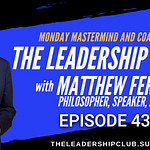(Only seeing the short clip? Be sure to sign-in to your TLC account to keep watching.)
Coaching Call #15 — July 15, 2024
In this week’s coaching call, we discussed:
Leading through highly emotional times like the events that took place over the weekend.
Accountability: Inquisition vs Accusation
Recognition Ideas - keeping it personal and relevant
A Guide to the Four Needs of Every Relationship
Here’s the recording, session notes and resources. If you have questions, let me know in the comments or by email.
The full TLC Monday Coaching Call recording and materials are available to upgraded subscribers. To enjoy The Leadership Club™ at its best, upgrade today!
Quick Reminders
Upcoming webinars, you can register now.
Email Amber at amorgan@matthewferrara.com if you want to be listed in the TLC Directory.
In Focus This Week: Leading Through Emotional Events
After this weekend’s events, people are probably feeling emotional and so are their clients. I suggest that as leaders we don’t just try to “move past this” by just proceeding with the to-do list, instead focus on your to-be list. When people are feeling frightened, shocked or upset:
Switch to a ministerial role
Show up authentically and open
Don’t try to solve the problem or resolve anyone’s feelings
Listen, relate, and be present
Remember the four needs for every relationship: significance, pride, certainty, and control. (Scroll down for a Guide to the Four Needs of all Relationships)
In-depth Topics this week:
Accountability: Stay in Inquisition and Avoid Accusation
Coaching requires us to be purposeful and intentional with our interactions to provide an opportunity for others to grow. Sometimes that means that we have to slow down and put ourselves in inquisitor mode so they can be put into contributor mode. They can contribute to the solutions to your questions and be involved with their plan to grow.
As part of the feed-forward process, we talked about accountability as a “counting up” of progress not a “calling out” of things undone. Anyone showing up for coaching already knows the counting up of things accomplished and left incomplete when they come to the conversation, but by Using the power of a positive question, and staying in inquisition mode, you can help them come to a plan or solution without having to deal with accusations.
For example, they did not have a lot of activity this week or they did not perform something that they said they were going to do rather than going in a call-out mode, move into the power of a positive question.
What held you back?
What would you like to try differently this week?
What could be something that I or one of your colleagues could do to support you in that?
What would be a better version of that effort this week?
Use the question to slow down and resist reaction.
Here’s more about feed-forward in last week’s newsletter:
Recognition Strategies
As great leaders, it’s our job to make sure people within our organizations are seen and heard, and that they are recognized for their contributions. Not only does this help them feel special but also that they feel special about being at your company.
Although there are industry achievements and official rewards, it’s essential to still recognize people in a way that matters to them. It’s incredibly personal to them.
Here are some of the recognition strategies and ideas that our TLC Leaders use:
Catching someone doing something good or going above and beyond
Personal handwritten thank you notes
Recognition for living up to your company’s core values
Knowing their favorite things and surprising them with those things
Awards that are about the unique person they are or what they contribute at work; silly but personal (i.e. the agent that doubles as a flight attendant, “The Most Travelled Agent”)
Showing support even when something doesn’t work out for them the way they wanted
Using the traveling manager approach: visiting, calling, or reaching out individually
Peer-nominated recognition
The key part of recognizing someone is relevance. Making a keep contribution to their lives - that’s relevant to them, not just what’s easy for leaders to do. The best system I have for this is relationship banking and playing a little “insider baseball”.
Here’s a previous article that explains more:
A Guide to the Four Needs of All Relationships
In all relationships, there are four key needs that must be filled and consistently refreshed:















